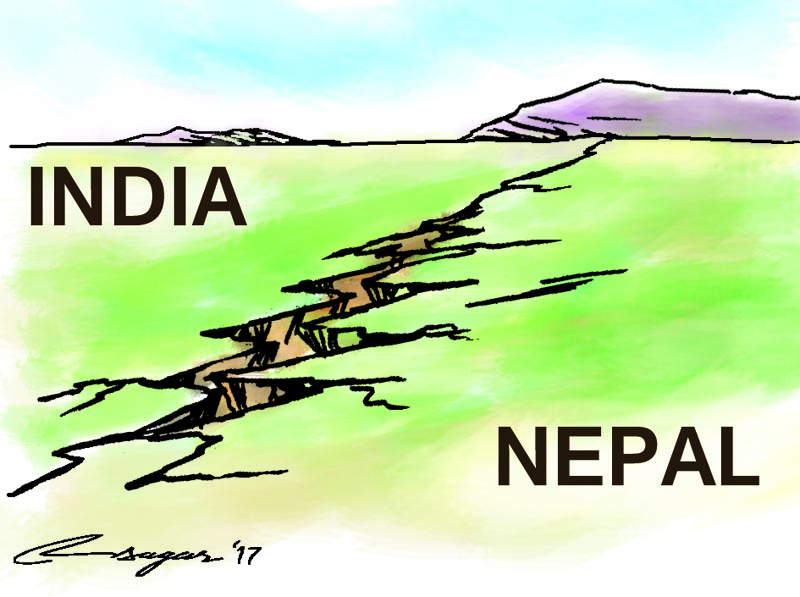Dehradoon Security Conference: Intellectual discourse
The Gorkha recruitment by the British in 1815 was the turning point weakening Nepal’s nationhood. Nepal’s capability for industrial development was completely ruined by the tripartite 1947 Gorkha Recruitment Treaty
The Dehradoon Security Conference was a jointly organized high level security conference by Kathmandu based NGO Neeti Anusandhan Pratishthan, Nepal (NeNAP) and Indian Council for International Co-operation in Dehradoon, Uttarakhanda of India on the 11th and 12th of April 2017.
This conference was designed to draw down the ups and downs in Indo-Nepal relations from contemporary security perspectives. In a nutshell, the aim was to focus on the different paradigms of their relations and recommend the framework to their respective governments from the informal sector.
It may be a burning question for most scholars and academia from both countries. The Indian team had a mixed composition of an ex-foreign relations expert, ex-bureaucrats, an ex-army general, government and non-governmental think tank groups from New Delhi and Uttarakhand headed by political leaders who had long experience as chief ministers in the Indian state.
The Nepali team was similar excluding political leaders and government’s think tank groups. Most of the participants were given the floor to express independently as individual country representatives to talk about their own respective countries’ foreign as well as security policies and fault lines existing in the bilateral relations.
From the author’s perspective, ‘demographic changes and threat to national security’ were dealt with focusing on Nepal’s geopolitical situation and excessive Indian influence in contemporary politics with particular focus on Nepal’s stability.
It was widely felt that terrorism was mostly encouraged by international powers and funded through the underworld. They are operated as proxy wars in the global arena.
The weaker states are radicalized through like-minded extremists and used against opposing powers. Before launching any campaign of de-radicalization, we must understand that all the extremists are radicalized, but not all the radicals are extremists.
We seldom understand this sensitivity and keep all the radicals and extremists in one basket and ruin the entire ethics of de-radicalizing process adversely. With this phenomenon, Indian predominance had been highlighted as exerting a centrifugal influence on demographic changes posing a threat to national security in Nepal.
Predominant influence by powerful nations is used through proxy measures. The weaker state generally suffers if it is unable to manage powerful neighbors. The huge influence of a country has close resemblance to the geopolitical context of a nation and the entire region in general.
The ‘big brother’ mindset of India to improve its neighborhood policy is the main hurdle to the resolution of bilateral differences and disputes unless it adopts the ‘Gujaral doctrine’ based on accommodation with India’s smaller neighbours based on trust and friendship.
In the wake of the changing security paradigm, the first meeting of National Security Chiefs of BIMSTEC member states was hosted in New Delhi on March 21, 2017 in which Nepal Armed Police IGP Singha Bahadur Shrestha had participated.
This indicates India is serious to lead without Pakistan to address traditional and non-traditional security challenges to harness economic prosperity and human security in the region.
Geopolitics is the study of the political and strategic relevance of geography in pursuit of national and international power. And, it is not a science but a discipline that analyses various forces on a given territory in a specific space.
Science deals with knowledge and to understand geopolitics, knowledge alone is not sufficient. Of course, geopolitics is a branch of knowledge which one has to be expert in to master it. If geopolitics is a discipline, we need to have a training that makes us willing to follow certain rules or to bear punishment if we break the rule.
The repeated economic embargoes by India are examples of failing to exercise other soft tools ignoring all international norms and values to use a geopolitical advantage against Nepal.
In its bilateral relations, the open border is the most challenging for population control as India has a population of 1.32 billion compared to 27 million of Nepal. The Gorkha recruitment by the British in 1815 was the turning point weakening Nepal’s nationhood.
Nepal’s capability for industrial development was completely ruined by the tripartite 1947 Gorkha Recruitment Treaty (Nepal-India-Britain) and later the Government of Nepal’s policy for foreign employment. Lacking domestic productivity, Nepal became fully dependent on Indian driven trade.
Basically, Indo-Nepal relationship is compounded by some contradictions of regional as well as global powers which need further elaboration and explanation.
Like China’s proxy involvement in North Korea to dominate Western powers, will Nepal be used by India similarly to play politics against China -- and due to its fragility possibly be used by Western powers to expand Christianity to polarize Eastern culture, including that of India.
Unnecessary Indian influence on Nepali politics was ignored by its leaders on the eve of the new constitution promulgation that led to an embargo through its influence over Madhesi leaders.
Bhattarai is an ex-Brigadier General and one of the participants of the conference






